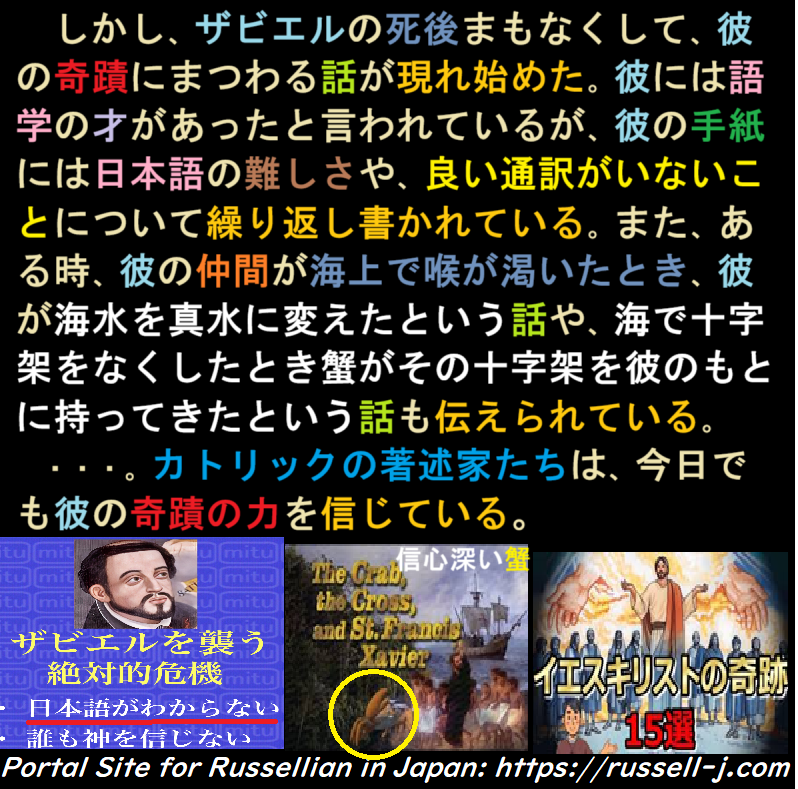
しかし、ザビエルの死後まもなくして、彼の奇蹟にまつわる話が現れ始めた。彼には語学の才があったと言われているが、彼の手紙には日本語の難しさや、良い通訳がいないことについて繰り返し書かれている。また、ある時、彼の仲間が海上で喉が渇いたとき,彼が海水を真水に変えたという話や、海で十字架をなくしたとき蟹がその十字架を彼のもとに持ってきたという話も伝えられている。・・・。カトリックの著述家たちは、今日でも彼の奇蹟の力を信じている。
But soon after Xavier's death accounts of miracles began to appear. He was said to have had the gift of tongues, although his letters are full of the difficulties of the Japanese language and the paucity of good interpreters. It was said that, on one occasion when his companions were thirsty at sea, he transformed salt water into fresh. When he lost a crucifix in the sea, a crab restored it to him. ... Catholic writers still credit him with miraculous powers ;
Source: Religion and Science, 1935, chapt. 1
More Info.:https://russell-j.com/beginner/RS1935_04-030.HTM
<寸言>
宗教においては、教祖や聖人や高僧が行ったという「奇跡」の力は欠かせないのでしょうか? 手を触れた者の病を治したとか、何百年も生きたとか、水をワインに変えたとか、 死者を生き返らせたとか、信じがたい話が多数伝えられてきています。
「今日のラッセルの言葉」に出てくるフランシスコ・ザビエルの話は、そういった「奇跡」を信じたい人に対する注意喚起になるのではないでしょうか?
いや、人々が奇跡を信じる傾向は、そう簡単に変わるものではなさそうです。「信仰」とは、科学的あるいは合理的に説明できないことを信じる行為です。科学的あるいは合理的に説明できることであればそれを理解するだけでよく、理解できない場合には教育によって理解できるようにすることが可能です。
しかし、現実に耐えられない人々は、現実以外に何か信じられるものを求め、絶対的に正しいと信ずるものが見つかれば、心が安定します。
他人に迷惑をかけなければ、たとえ非常に非現実的なことを信じていたとしても、実害はあまりないでしょうが、そうはいかないのが現実です。古今東西、「狂信者」は多くの害悪をこの世にもたらしてきました。
宗教的狂信による悲劇としては、十字軍によるイスラム教徒やユダヤ人の大量虐殺、中世における魔女狩り、三十年戦争(ドイツ中心に約800万人が死亡)、イスラム過激派のテロ行為、日本のオウム真理教によるサリン事件などが思い浮かびます。政治的・民族的狂信による悲劇としては、ヒトラー率いるナチス政権によるホロコースト、中国の文化大革命による粛清などはよく知られています。
現在、宗教の数は無数といってよいほどあり、多くの宗教が平和を目指すと唱えていますが、一方で、布教や勢力拡大が優先されているように見える事例も少なくありません。 どうして宗教団体は、表では協力しながら、布教活動の時は他宗教や他宗派の欠点をあえて指摘するのでしょうか?
Is the power of so-called "miracles" performed by founders of religions, saints, or revered monks indispensable in religion? Numerous incredible stories have been passed down, of illnesses healed by a mere touch, of people living for hundreds of years, of water turned into wine, or of the dead brought back to life.
The story of Francis Xavier mentioned in Today's Words of Russell may serve as a cautionary tale for those who are eager to believe in such "miracles."
However, the tendency of people to believe in miracles does not seem so easily changed. "Faith" is the act of believing in things that cannot be explained scientifically or rationally. If something can be explained scientifically or rationally, it only needs to be understood; and if it cannot be understood, education can help make it understandable.
Yet, those who find reality unbearable often seek something beyond it to believe in. If they can find something they believe to be absolutely right, their minds find a sense of stability.
As long as it does not harm others, even believing in extremely unrealistic things may not cause serious problems, but reality is rarely so benign. Throughout history and across cultures, "fanatics" have brought great harm into the world.
Among the tragedies caused by religious fanaticism are: the mass killings of Muslims and Jews during the Crusades, the witch hunts of the Middle Ages, the Thirty Years' War the Thirty Years’ War (which resulted in the deaths of around eight million people, many of whom were killed in the German territories), acts of terrorism by Islamic extremists, and the sarin gas attack carried out by Japan's Aum Shinrikyo. As for the tragedies caused by political or ethnic fanaticism, the Holocaust under Hitler's Nazi regime and the purges during China's Cultural Revolution are well known.
>
Today, there are countless religions, many of which claim to pursue peace. However, there are also not a few cases where the expansion of influence and proselytizing seem to take precedence. Why is it that religious organizations, while appearing cooperative on the surface, often point out the flaws of other religions or sects when engaging in missionary activities?